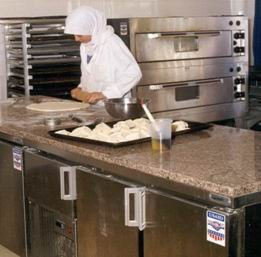
Challenge
The Baqa’a refugee camp, 20 minutes north of Jordan’s capital, Amman, is home to 120,000 refugees. It is considered one of six “emergency” camps set up in 1968 to accommodate Palestinian refugees and displaced persons who left the West Bank and Gaza Strip as a result of the 1967 Arab-Israeli war. The need to support the camp’s growing population has become more urgent. The camp’s capacity has grown into a community that aims to improve the quality of life for its residents through initiatives that develop skills and trades while generating a source of income to support their families. One such initiative is a bakery with outdated and faulty equipment that ultimately led to inefficiency, lower production levels, and reduced quality of product
Initiative
The bakery, which supplies camp residents with baked goods, had equipment that was more than 10 years old and wearing down, yet it was unable to purchase new equipment. It employs 12 women ages 25 to 35, who are the main income providers for their families. With USAID support, the bakery received an industrial sized oven and mixer, which injected new life into its work.
Results
The bakery’s productivity level increased considerably with the new equipment. The young women learned additional skills in the art of baked goods and remain integrated in the neighborhood economy. The bakery has expanded its product line from just bread loaves to include now desserts and special orders. In addition to serving the camp residents, the bakery also supplies several school cafeterias in and around the capital. The young women’s monthly salaries have risen from 90 Jordanian dinars (approximately $125) to 135 dinars ($190), so the impact of the bakery’s success has gone beyond merely producing high-quality goods to improving these young women’s lives and their families. For example, through her increased income, Lina Rahhal is assisting her sister to study history and her brother to study special education at Jordan’s Al-Balqa’ University.







Comment
Make a general inquiry or suggest an improvement.